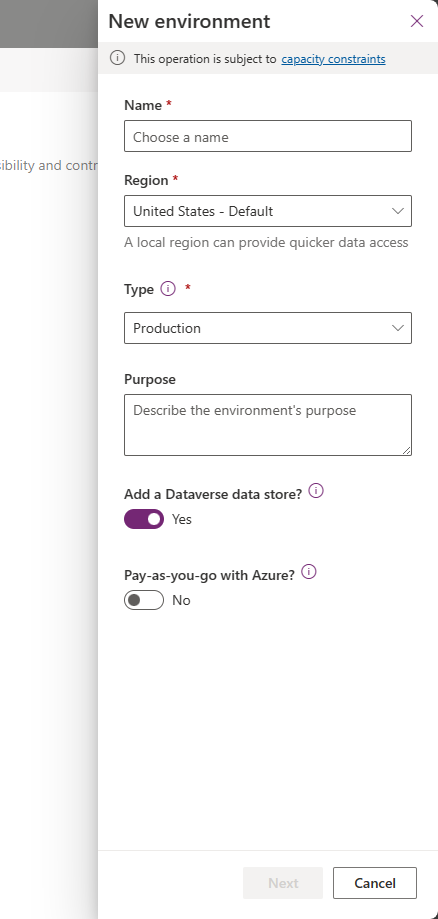Notikumi
Jaudīga izstrādātāju konference un uzlaušana kopā
12. febr. 23 - 28. febr. 23
Pievienojieties tiešsaistes konferencei un 2 nedēļu hakatonam, lai izpētītu jaudīgu risinājumu veidošanu, izmantojot Power Platform.
Reģistrēties tūlītŠī pārlūkprogramma vairs netiek atbalstīta.
Jauniniet uz Microsoft Edge, lai izmantotu jaunāko līdzekļu, drošības atjauninājumu un tehniskā atbalsta sniegtās priekšrocības.
With Copilot Studio, you can create agents in different environments and easily switch between them.
An environment is a space to store, manage, and share your organization's business data. The agents you create are stored in an environment (apps and flows are also stored in environments). Environments might also have different roles, security requirements and target audiences, and each environment is created in a separate location. For more information, see the following articles:
There are many strategies for using multiple environments. For example, you can:
You can also enable maker welcome content for your environments, and configure environment routing in the Power Platform admin center.
You can also build all your agents in a single environment if you don't need or want to use different ones.
Piezīme
We recommend using a non-default production environment for agents that you want to deploy to production.
Learn more about the types of environments.
When you first sign in and create a new agent, a default environment is created for you.
You can, however, create more environments as needed by using the Power Platform admin center.
Go to https://admin.powerplatform.com and sign in using your work account. Use the same tenant that you use for Copilot Studio.
Go to the Environments tab and select + New to open the New environment pane.

For Name, specify a unique name for the environment.
For Type select the environment type.
Piezīme
A production environment is intended for production scenarios and isn't subject to the same restrictions as a trial environment. If you are trying out Copilot Studio for free, make sure you set the environment to Trial. The standard limitations for trial environments apply.
For Region select the support data region where you want the environment to be created.
Set Add a Dataverse data store? to Yes.
Select Next.

Piezīme
The environment must be created in a supported region. Learn more about data locations.
Specify the details of the Dataverse data store, such as the language, currency type, and security group and then select Save. This operation takes you back to the Environments tab.
Select Refresh to see the new environment. It might take a few minutes before the environment becomes available.
After the environment is created, you can return to Copilot Studio and use the environment to create a new agent.
Select the environment in the environment switcher on the top menu bar.
To create an agent in an environment, you need access to the environment. If you don't have access, you need to be a system administrator or contact the system administrator to grant access. You then need to complete the following steps:
Create an agent in the environment (this step installs the necessary Copilot Studio solutions).
Assign the security role of "agent author" to yourself in the environment.
Return to Copilot Studio and create an agent in the environment.
When you trial Copilot Studio, you can create trial environments that expire after 30 days. When the environment expires, all the agents in the environment are deleted. This causes all the data associated with the agent, including any flows and resources you have been using, to be lost.
If you created your own environment and selected Trial as the environment type, you receive email messages shortly before the environment expires. In Copilot Studio, you also see a notification if you have agents created in a trial environment that is going to expire in less than two weeks.
Svarīgi
There's a difference between an expiring environment and an expiring license. If your license is expiring, you can extend it without losing any data.
When using a trial environment and you want to retain the agents for longer than 30 days, you must convert the trial environment to a production environment.
Copilot Studio supports the following environment lifecycle operations, as described in Power Platform environments overview:
The following operation is unsupported:
When you're creating an agent, you might encounter the following issues.
In this case, you see this error: "You do not have permissions to any environments. Get access from an administrator."
You need to create a new environment. Use that environment to create your agent.
Your environment might not show up in the drop-down menu due to one of the following causes:
Notikumi
Jaudīga izstrādātāju konference un uzlaušana kopā
12. febr. 23 - 28. febr. 23
Pievienojieties tiešsaistes konferencei un 2 nedēļu hakatonam, lai izpētītu jaudīgu risinājumu veidošanu, izmantojot Power Platform.
Reģistrēties tūlītApmācība
Modulis
Create and manage environments in Microsoft Dataverse - Training
An environment is a space to store, manage, and share your organization's business data that is stored within an instance of a Dataverse database. You can set up one or many environments, depending on the needs of your organization. This module explores these environments and how you can use them with instances of Dataverse databases.
Sertifikācija
Microsoft Certified: Power Platform Developer Associate - Certifications
Demonstrate how to simplify, automate, and transform business tasks and processes using Microsoft Power Platform Developer.
Dokumentācija
Export and import agents using solutions - Microsoft Copilot Studio
Transfer agents between environments by adding them to solutions.
Security and governance - Microsoft Copilot Studio
Use the security and governance controls in Power Platform and Microsoft 365 to manage the security of your data when creating, publishing, and using agents built with Copilot Studio.
Deploy and enable actions in Copilot Studio - Microsoft Copilot Studio
Deploy Copilot Studio in Microsoft 365 admin center to enable conversational and AI actions in chats.